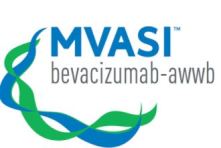Weeks of September 11 and 18, 2017

MVASI (bevacizumab-awwb) solution for intravenous infusion
Amgen, Inc
INDICATIONS:
- Metastatic colorectal cancer, in combination with intravenous 5-fluorouracil-based chemotherapy for first- or second-line treatment. Mvasi is not indicated for the adjuvant treatment of surgically resected colorectal cancer.
- Metastatic colorectal cancer, in combination with fluoropyrimidine-irinotecan- or fluoropyrmidine-oxaliplatin-based chemotherapy for the second-line treatment of patients who have progressed on a first-line bevacizumab product-containing regimen. Mvasi is not indicated for the adjuvant treatment of surgically resected colorectal cancer.
- Non-squamous non-small cell lung cancer, in combination with carboplatin and paclitaxel for first line treatment of unresectable, locally advanced, recurrent or metastatic disease.
- Glioblastoma with progressive disease following prior therapy, based on improvement in objective response rate. No data is available demonstrating improvement in disease-related symptoms or survival with bevacizumab products.
- Metastatic renal cell carcinoma, in combination with interferon alfa.
- Cervical cancer that is persistent, recurrent, or metastatic, in combination with paclitaxel and cisplatin or paclitaxel and topotecan.
ADDRESSING UNMET NEED: First biosimilar (to Avastin) approved in the U.S. for the treatment of cancer
REG PATHWAY: BLA (biosimilar, not an interchangeable product)
- Postmarketing commitments: Drug substance stability, method validation, endotoxin detection method
DESCRIPTION: Recombinant humanized monoclonal IgG1 antibody that binds to and inhibits the biologic activity of human vascular endothelial growth factor (VEGF) in in vitro and in vivo assay systems
BIOSIMILARITY: Extensive structural and functional characterization, animal study data, human pharmacokinetic and pharmacodynamics data, clinical immunogenicity data and clinical safety and effectiveness data
EFFICACY:
- 4 Studies in Metastatic Colorectal Cancer: Double blind, open label, survival improvement
- Adjuvant Treatment of Colon Cancer: No efficacy
- Unresectable Non–Squamous Non–Small Cell Lung Cancer: Single, large, randomized, active-controlled, open-label, multicenter study. Higher Overall Survival
- Glioblastoma: Open-label, multicenter, randomized, non-comparative study.Efficacy based on WHO radiographic criteria and by stable or decreasing corticosteroid use
- Metastatic Renal Cell Carcinoma: Multicenter, randomized, double-blind,
international study. Statistically significantly prolonged progression free survival - Persistent, Recurrent, or Metastatic Carcinoma of the Cervix: Randomized, four-arm, multi-center trial. Higher overall survival
SAFETY:
- Boxed Warning: Increased risk of gastrointestinal perforations; surgery and wound healing complications; severe or fatal pulmonary, gastrointestinal, central nervous system and vaginal bleeding
- Serious expected side effects: Perforation or fistula, arterial and venous thromboembolic events), hypertension, encephalopathy syndrome, proteinuria, ovarian failure
- Common expected side effects: Epistaxis), headache, hypertension, rhinitis, proteinuria, taste alteration, dry skin, hemorrhage, lacrimation disorder, back pain and exfoliative dermatitis

SOLOSEC (secnidazole) oral granules
Symbiomix Therapeutics
INDICATION: Treatment of bacterial vaginosis in adult women
ADDRESSING UNMET NEED:
- New medication for bacterial vaginosis
- First one-dose oral regimen for most common vaginal infection in adult women
REG PATHWAY: NDA
- Qualified Infectious Disease Product (QIDP) designation
- Fast Track designation, Priority Review
- Deferred pediatric assessments
MECHANISM OF ACTION: Nitroimidazole antimicrobial drug
EFFICACY:
- Two randomized placebo-controlled clinical trials, n=144 and 189, patients with diagnosed bacterial vaginosis
- Efficacy: Clinical outcome in 21 to 30 days, “normal” vaginal discharge, negative
“whiff” test, and clue cells <20% - Statistically significantly greater % clinical outcome with Solosec
SAFETY:
- Most common adverse reactions: Vulvo-vaginal candidiasis, headache, nausea, diarrhea, abdominal pain, vulvovaginal pruritus
ALIQOPA (copanlisib) for injection
Bayer Healthcare Pharmaceuticals
INDICATION: Treatment of adult patients with relapsed follicular lymphoma (FL) who have received at least two prior systemic therapies.
ADDRESSING UNMET NEED:
- 72,240 people in US diagnosed with some form of non-Hodgkin lymphoma this year; approximately 20,140 patients will die from disease in 2017
- Approval provides additional choice for treatment, filling an unmet need
REG PATHWAY: NDA
- Accelerated approval, Priority Review designation, Orphan Drug designation
- Accelerated approval based on overall response rate; continued approval contingent upon verification of clinical benefit in confirmatory trial
- Other postmarketing requirements: Long term safety, clinical pharmacology studie
- Pediatric assessment exemption
MECHANISM OF ACTION: Inhibitor of phosphatidylinositol-3-kinase with inhibitory activity predominantly against PI3K-α and PI3K-δ isoforms expressed in malignant B cells; induces tumor cell death
EFFICACY:
- Single-arm, multicenter, Phase 2 clinical trial, n=142 subjects with relapsed follicular B-cell non-Hodgkin lymphoma
- Efficacy Endpoints: Tumor response according to the IWG criteria for malignant lymphoma. Overall Response rate (ORR) by Independent Review Committee.
- ORR: 59%, with median duration of response of 12.2 months
SAFETY:
- Common side effects: Hyperglycemia, diarrhea, decreased general strength and energy, hypertension, leukopenia, neutropenia, nausea, lower respiratory tract infections, thrombocytopenia
- Serious side effects: Infections, hyperglycemia, hypertension, non-infectious pneumonitis, neutropenia, severe skin reactions, harm to developing fetus or newborn baby
Image credits: Amgen, Symbiomix, Bayer
